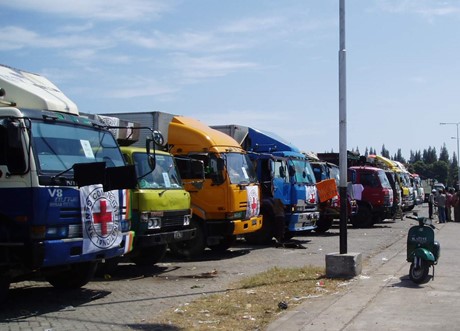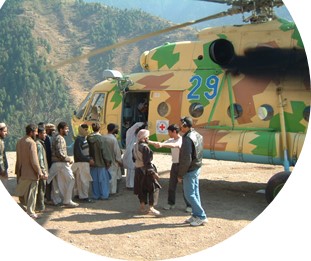How Can We Help?
Safety, security and incident reports
Whenever vehicles are used to transport goods belonging to the Red Cross Movement, it is strictly forbidden to transport:
- weapons of any sort
- any personal items or other freight not directly related to the operation requiring transport services
- people, be they Red Cross personnel, military, or beneficiaries. An exception would be providing urgent transport to the nearest medical facility, but this must, as far as possible, be agreed with a security or fleet manager beforehand and captured in an incident report upon return.
Any observed breach of these rules must be immediately reported in an incident report.
Reporting incidents
All incidents involving British Red Cross staff or property must be reported – refer to the British Red Cross or applicable National Society’s incident reporting procedure for information on how to do this.
Where British Red Cross delegates are seconded into another organisation such as the or , or where they are working under the umbrella of another organisation such as a , this organisation’s incident reporting procedure must also be followed, in parallel to that of British Red Cross.
Use of military transport means
As per the Movement guidelines on the use of military and civil defense assets (MCDA) in disaster relief:
“Military assets should only be used as a last resort, where there is no civilian alternative and only the use of military assets can meet a critical humanitarian need.”
No armed escort is allowed for shipments undertaken for the Red Cross Movement, unless:
- There is extremely pressing need (e.g., to save lives on a large scale).
- It represents no added security risk to beneficiaries.
- No one else can meet the needs.
- Armed protection is for deterrence and not firepower.
- Parties controlling the territory are in full agreement with armed escort.
- Protection against bandits/criminals is needed.
- Authorisation is given in advance, at the specified level – typically secretary general or senior director within the HNS and ICRC/IFRC in Geneva.
All military actors run the risk of not being perceived as neutral and jeopardising the Red Cross Movement’s commitment to neutrality and impartiality. Absolute rules in terms of using military resources are:
- Never use armed military transports.
- Never use the assets of a party involved in an armed conflict.
- Never use military assets simply because they are available.
Use of the RC emblem on transport not owned by Red Cross
Red Cross-owned fleet will always bear a Red Cross emblem. The decision on which emblem (, , British Red Cross or ) to use will be made in discussion with the lead Red Cross Movement partner and the HNS – this applies to both Red Cross-owned and Red Cross-rented vehicles.

Where fleet is rented, the emblem must be clearly visible on the rented vehicle (truck, small vehicle, boat, or plane).

On road vehicles, flags should be used at the front of the vehicle. The emblem, in whatever form, must be removed and retained by the Red Cross logistics or transport manager immediately after the vehicle is no longer serving the Movement.

Based on the above conditions, where the Red Cross agree to use military assets for transportation, vehicles must visibly carry the emblem.

Read the next section on Transport documentation here.
Related resources
Download useful tools and templates here

